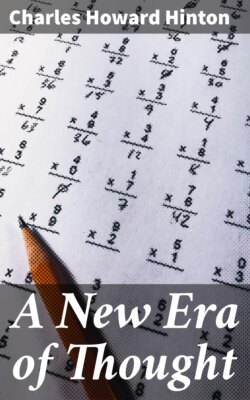Читать книгу A New Era of Thought - Charles Howard Hinton - Страница 9
На сайте Литреса книга снята с продажи.
CHAPTER III.
THE ELEMENTS OF KNOWLEDGE.
ОглавлениеTable of Contents
There are two elements which enter into our knowledge with respect to any phenomenon.
If, for instance, we take the sun, and ask ourselves what we observe, we notice that it is a bright, moving body; and of these two qualities, the brightness and the movement, each seems equally predicable of the sun. It does move, and it is bright.
Now further study discloses to us that there is a difference between these two affirmations. The motion of the sun in its diurnal course round the earth is only apparent; but it is really a bright, hot body.
Now of these two assertions which the mind naturally makes about the sun, one—that it is moving—depends on the relation of the beholder to the sun, the other is true about the sun itself. The observed motion depends on a fact affecting oneself and having nothing to do with the sun, while the brightness is really a quality of the sun itself.
Now we will call those qualities or appearances which we notice in a body which are due to the particular conditions under which oneself is placed in observing it, the self elements; those facts about it which are independent of the observer’s particular relationship we will call the residual element. Thus the sun’s motion is a self element in our thought of the sun, its brightness is a residual element.
It is not, of course, possible to draw a line distinctly between the self elements and the residual elements. For instance, some people have denied that brightness is a quality of things, but that it depends on the capacity of the being for receiving sensations; and for brightness they would substitute the assertion that the sun is giving forth a great deal of energy in the form of heat and light.
But there is no object in pursuing the discussion further. The main distinction is sufficiently obvious. And it is important to separate the self elements involved in our knowledge as far as possible, so that the residual elements may be kept for our closer attention. By getting rid of the self elements we put ourselves in a position in which we can propound sensible questions. By getting rid of the notion of its circular motion round the earth we prepare our way to study the sun as it really is. We get the subject clear of complications and extraneous considerations.
It would hardly be worth while to dwell on this consideration were it not of importance in our study of arrangement. But the fact is that directly a subject has been cleared of the self elements, it seems so absurd to have had them introduced at all that the great difficulty there was in getting rid of them is forgotten.
With regard to the knowledge we have at the present day about scientific matters, there do not seem to be any self elements present. But the worst about a self element is, that its presence is never dreamed of till it is got rid of; to know that it is there is to have done away with it. And thus our body of knowledge is like a fluid which keeps clear, not because there are no substances in solution, but because directly they become evident they fall down as precipitates.
Now one of our serious pieces of work will be to get rid of the self elements in the knowledge of arrangement.
And the kind of knowledge which we shall try to obtain will be somewhat different from the kind of knowledge which we have about events or natural phenomena. In the large subjects which generally occupy the mind the things thought of are so complicated that every detail cannot possibly be considered. The principles of the whole are realized, and then at any required time the principles can be worked out. Thus, with regard to a knowledge of the planetary system, it is said to be known if the law of movement of each of the planets is recognized, and their positions at any one time committed to memory. It is not our habit to remember their relative positions with regard to one another at many intervals, so as to have an exhaustive catalogue of them in our minds. But with regard to the elements of knowledge with which we shall work, the subject is so simple that we may justly demand of ourselves that we will know every detail.
And the knowledge we shall acquire will be much more one of the sense and feeling than of the reason. We do not want to have a rule in our minds by which we can recall the positions of the different cubes, but we want to have an immediate apprehension of them. It was Kant who first pointed out how much of thought there was embodied in the sense impressions; and it is this embodied thought which we wish to form.
